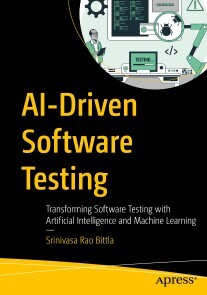AI-Driven Software Testing
62,99 €
Sofort verfügbar, Lieferzeit: Sofort lieferbar
AI-Driven Software Testing, Apress
Transforming Software Testing with Artificial Intelligence and Machine Learning
Von Srinivasa Rao Bittla, im heise shop in digitaler Fassung erhältlich
Produktinformationen "AI-Driven Software Testing"
AI-Driven Software Testing explores how Artificial Intelligence (AI) and Machine
Learning (ML) are revolutionizing quality engineering (QE), making testing more
intelligent, efficient, and adaptive.
The book begins by examining the critical role of QE in modern software
development and the paradigm shift introduced by AI/ML. It traces the evolution
of software testing, from manual approaches to AI-powered automation,
highlighting key innovations that enhance accuracy, speed, and scalability.
Readers will gain a deep understanding of quality engineering in the age of AI,
comparing traditional and AI-driven testing methodologies to uncover their
advantages and challenges. Moving into practical applications, the book delves
into AI-enhanced test planning, execution, and defect management. It explores
AI-driven test case development, intelligent test environments, and real-time
monitoring techniques that streamline the testing lifecycle. Additionally, it
covers AI’s impact on continuous integration and delivery (CI/CD), predictive
analytics for failure prevention, and strategies for scaling AI-driven testing
across cloud platforms. Finally, it looks ahead to the future of AI in software
testing, discussing emerging trends, ethical considerations, and the evolving
role of QE professionals in an AI-first world.
With real-world case studies and actionable insights, AI-Driven Software Testing
is an essential guide for QE engineers, developers, and tech leaders looking to
harness AI for smarter, faster, and more reliable software testing.
What you will learn:
• What are the key principles of AI/ML-driven quality engineering
• What is intelligent test case generation and adaptive test automation
• Explore predictive analytics for defect prevention and risk assessment
• Understand integration of AI/ML tools in CI/CD pipelines
Who this book is for: Quality Engineers looking to enhance software testing with
AI-driven techniques. Data Scientists exploring AI applications in software
quality assurance and engineering. Software Developers – Engineers seeking to
integrate AI/ML into testing and automation workflows.
Part 1.- Chapter 1: The Role of AI and ML in Modern Software Testing.- Chapter
2: Software Testing from Manual to AI-Driven Automation.- Chapter 3: Quality
Engineering in the Age of AI.- Chapter 4: Comparing Traditional and AI-Driven
Testing.- Chapter 5: SDLC vs STLC Understanding the Basics.- Chapter 6: The
Testing Pyramid in Traditional and AI-Driven Testing.- Part 2.- Chapter 7:
Revolutionizing Test Planning and Execution with AI/ML.- Chapter 8: Intelligent
Test Case Development with AI/ML.- Chapter 9: AI/ML-Driven Test Setup and
Management.- Chapter 10: AI/ML in Smart Defect Management and Resolution.-
Chapter 11: Test Closure with AI/ML Reporting and Continuous Feedback.- Chapter
12: Eliminating Testing Gaps with AI/ML Precision.- Part 3.- Chapter 13: Scaling
Software Testing with AI/ML.- Chapter 14: Enhancing CI/CD Pipelines with AI/ML
Driven Testing.- Chapter 15: AI/ML for Real-Time Test Execution Monitoring.-
Chapter 16: Predicting Failures with AI/ML Analytics.- Chapter 17: The Future of
QE with AI-Driven Testing.- Chapter 18. Next Steps to Implementing AI-Driven QE.
Artikel-Details
- Anbieter:
- Apress
- Autor:
- Srinivasa Rao Bittla
- Artikelnummer:
- 9798868818295
- Veröffentlicht:
- 05.11.25
Barrierefreiheit
This PDF has been created in accordance with the PDF/UA-1 standard to enhance accessibility, including screen reader support, described non-text content (images, graphs), bookmarks for easy navigation
- entspricht den Vorgaben der PDF / UA 1 (05)
- keine Vorlesefunktionen des Lesesystems deaktiviert (bis auf) (10)
- navigierbares Inhaltsverzeichnis (11)
- logische Lesereihenfolge eingehalten (13)
- kurze Alternativtexte (z.B für Abbildungen) vorhanden (14)
- Inhalt auch ohne Farbwahrnehmung verständlich dargestellt (25)
- hoher Kontrast zwischen Text und Hintergrund (26)
- Navigation über vor-/zurück-Elemente (29)
- alle zum Verständnis notwendigen Inhalte über Screenreader zugänglich (52)
- Kontakt zum Herausgeber für weitere Informationen zur Barrierefreiheit (99)

